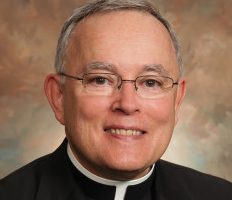Speaking at the University of Notre Dame in October 2016, just a few weeks before a national election that seemed sure to put a second Clinton in the White House, I noted that
[Q]uite a few of us American Catholics have worked our way into a leadership class that the rest of the country both envies and resents. And the price of our entry has been the transfer of our real loyalties and convictions from the old Church of our baptism to the new “Church” of our ambitions and appetites. People like Nancy Pelosi, Anthony Kennedy, Joe Biden and Tim Kaine are not anomalies. They’re part of a very large crowd that cuts across all professions and both major political parties.
During his years as bishop of Rome, Benedict XVI had the talent of being very frank about naming sin and calling people back to fidelity. Yet at the same time he modeled that fidelity with a kind of personal warmth that revealed its beauty and disarmed the people who heard him. He spoke several times about the “silent apostasy” of so many Catholic laypeople today and even many priests; and his words have stayed with me over the years because he said them in a spirit of compassion and love, not rebuke.
Apostasy is an interesting word. It comes from the Greek verb apostanai – which means to revolt or desert; literally “to stand away from.”
For Benedict, laypeople and priests don’t need to publicly renounce their baptism to be apostates. They simply need to be silent when their Catholic faith demands that they speak out; to be cowards when Jesus asks them to have courage; to “stand away” from the truth when they need to work for it and fight for it.
It’s a word to keep in mind in examining our own hearts and the hearts of our people. And while we do that, we might reflect on what assimilating has actually gained for us when Vice President Biden conducts a gay marriage, and Senator Kaine lectures us all on how the Church needs to change and what kind of new creature she needs to become.
Those words displeased some who see Mr. Biden as a veteran public servant and a well-intentioned, decent man trying honestly to balance his religious faith with the demands of a complicated political terrain.
On the complicated nature of today’s politics, there can be no dispute. But complexity is never an all-purpose excuse, especially on matters of principle, and most especially when the innocent and voiceless stand to pay the price for a bad choice.
In defending Mr. Biden, his advocates have typically pointed to his long-standing support for the Hyde Amendment banning federal funds for abortion; his support for Catholic teaching on various other social issues; and his resistance to late term abortion, all admirable positions. In today’s Democratic Party, these things marked him as a “centrist” and set him apart from the pack of other Democratic presidential hopefuls — nearly all of them hard to his left.
That was before last week.
On June 6, the Wall Street Journal reported (“Biden’s Abortion Views Irk the Left”) that Biden faced growing criticism from abortion activists and his party’s leadership for his Hyde Amendment track record.
Exactly 24 hours later, on June 7, the same paper noted that Biden had sharply changed his thinking (“Biden, in Reversal, Backs Abortion Funding”). Translation: The unborn child means exactly zero in the calculus of power for Democratic Party leaders, and the right to an abortion, once described as a tragic necessity, is now a perverse kind of “sacrament most holy.” It will have a candidate’s allegiance and full-throated reverence . . . or else.
There’s a remark by Thomas More in the film A Man for All Seasons that’s worth remembering in the months ahead: “When statesmen forsake their own private conscience for the sake of their own public duties, they lead their country by a short route to chaos.”
We can’t say we weren’t warned.
—————————-
Archbishop Charles J. Chaput, O.F.M. Cap., D.D. is the archbishop of the Diocese of Philadelphia



You must be logged in to post a comment.